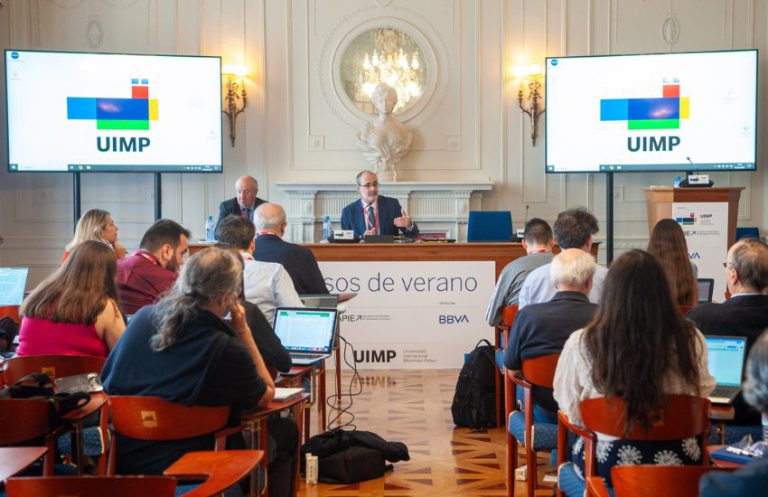Public and private institutions are accelerating their plans to improve financial education in Spain, which lags behind Europe in this area
According to CIS polls, the economic crisis has firmly established itself as one of the main concerns of Spaniards. Interestingly, this focal point of concern contrasts with the fact that our financial education is among the least developed in Europe. Spain has the fourth worst education in economics and finance on the continent, according to the latest Eurobarometer on financial education. So much so that barely 19% answered basic questions about the impact of inflation or different interest rates correctly, compared to an EU average of 26%.
The bad news doesn't end there: only 13% of Spaniards have a high level of financial literacy, a far cry from the 28% in the Netherlands. Why is that? Adriana Scozzafava, Managing Director of Fundación Afi Emilio Ontiveros, points to the formal education received in Spain at an early age as the main reason: "Although changes have been introduced into the school curriculum, the teaching of economics and finance has been limited and confined to a few grades".
To this, she continues, one must add a "lack of perception of the direct relevance of financial knowledge in our daily lives, which can lead to a lack of interest in the subject". The current global economic instability underscores the importance of consumers having the necessary skills to manage their finances effectively. In many cases this is far from being the case.
A recent study by BFF Bank concludes that 30% of respondents accept that they are unaware of aspects related to the attractiveness of bank deposits or their associated interest rates. Additionally, despite the fact that rising interest rates and geopolitical uncertainty are impacting on the slowdown in real estate activity, the report claims that Spaniards still hold the view that real estate "is the safest and most attractive option for investing and protecting their savings against inflation"
In the current situation, Scozzafava believes that citizens need to have a clear understanding of basic concepts such as simple and compound interest, knowing what they are and how they are calculated or the impact they can have. In her opinion, there needs to be specific training at an early age and the knowledge gap in the adult population needs to be addressed. And part of that learning, she says, is reinforced in the family environment: "There is evidence that in households where parents are financially literate, their children have a higher level".
In addition to learning how to control daily expenses and income, saving or planning for the medium and long term, "other skills have emerged that need to be explored in greater depth, such as learning how to handle digital applications with ease," maintains Alberto Aza, spokesperson for CECA. In his opinion, improving in all these areas entails "public administrations taking responsibility for implementing plans to promote financial education and for educational institutions to apply them as effectively as possible in their schools".
The public and private sectors have a common framework in the Financial Education Plan, to which CECA has adhered, the aim of which is to promote initiatives that bring financial literacy closer to all groups. Taking into account, moreover, that "young people do not have the same needs as the elderly, nor the same priorities".
In this context, the need to integrate financial education into the school curriculum, as an integral part of subjects such as mathematics or economics, is already being considered. If this proposal were to be implemented, "it would be a significant step forward", according to the expert.
AWARENESS
This was precisely one of the objectives of the aforementioned Financial Education Plan, launched in 2008 by the Bank of Spain and the National Securities Market Commission (CNMV). The strategy, also supported by the Ministries of Education, Consumer Affairs and Economy, seeks to work with as many educational institutions as possible to raise awareness among the school population of the importance of basic finance.
"In 2008, schools were not discussing finance except in very specific and closely related subjects", says Fernando Tejada, Director of the Institutions' Conduct Department at the Bank of Spain. Now, thanks to the Financial Education Plan, even if they are not compulsory subjects, "the education authorities have included basic finance in all their curricula". We have done our part by providing teachers with materials, modules and teaching resources".
Beyond the school-age population, the Financial Education Plan seeks, through capillarity and collaboration with as many stakeholders as possible, to reach segments of the population at risk of financial exclusion, which the Bank of Spain and the CNMV would not be able to reach on their own. ONCE, Red Cross and other NGOs are facilitating this task.
The elderly are among those at risk of financial exclusion, even more so due to the unstoppable advance of digitalisation. The Spanish Banking Association (AEB), which also collaborated with the Bank of Spain in the preparation of the Financial Education Plan, is one of the most active organisations in the search for a solution to this problem.
Juan Carlos Delrieu, head of sustainability at the AEB, recalls that four years ago "the Expertclick programme was launched together with Fundación Cibervoluntarios and the support of the Ministry of Social Affairs". "More than 5,000 people have benefited" from this initiative, which has facilitated the acquisition of digital skills free of charge.
Over the last year, the AEB has enhanced Expertclick with three additional projects. Among them, Conectando Mayores (Connecting the Elderly) stands out: "We want the elderly themselves to share their knowledge about the use of technological tools with other people in their age group and in the same situation as them. This creates a greater bond, as they have a common language and shared concerns". The pilot programme was a success, with some 2,500 people taking part in its first year.
This type of initiative, as pointed out by Tejada, does not mean that face-to-face customer service will not continue to be reinforced. Especially in "rural areas, where there is a greater concentration of an ageing population". So much so that, in its latest version, the Financial Education Plan already includes the intention to implement digital and physical services.













